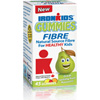
We know vitamins are good for growing children who don’t always eat a full range of fruits and vegetables and for teens who prefer fries to a salad but did you know that specific vitamins are important for adults whose nutritional needs change as they mature?
VITAMINS – FOR ALL AGES
Vitamin C
This essential antioxidant that keeps your immune system aging and wards off common viruses. This water soluble vitamin needs to be replenished daily and can be found in fruits in vegetables, and 100% juice. Dieticians of Canada recommend 75mg a day for women and 90mg a day for men.
B-Complex
Included in the B-Complex vitamins are thiamine(B1), riboflavin(B2), niacin(B3), pantothenic acid(B5), pyridoxine(B6), biotin(B7), folic acid(B9) and cobalamin(B12). This family of 8 B-vitamins is vital to healthy body functioning to process and use the food you eat to give you energy, produce and repair your DNA, fight disease and infection, and keep your nervous system, skin and muscle tissue healthy. Diary, eggs, beans, dark green leafy vegetables and meat are great sources of B vitamins.
Calcium
Stick with Calcium to ensure strong bones and teeth as you age. The time to prevent osteoporosis is now. Osteoporosis Canada recommends adults aged 19-50 years take 1,000 milligrams of calcium daily. Add up the milk, yogurt, cheese and calcium rich vegetables such a broccoli and kale, and make sure you are getting enough. Consider supplementing with your kids IronKids Calcium Gummies – 200mg of calcium per gummy!
Vitamin D
This vitamin helps the body absorb calcium to support healthy bones and teeth. A growing body of research is showing us that Vitamin D is important in preventing cancers, autoimmune diseases, cardiovascular disease and improving immune function. Health Canada’s recommended daily intake is at least 600IU of Vitamin D for adults. Few foods naturally contain vitamin D, so look for those fortified such as milk, orange juice, cereal and consider a supplement such as Adult Essentials Vitamin D Gummies.
EXTRA VITAMINS YOU NEED AS YOU AGE
20s and 30s
Folic Acid
Important before and during pregnancy, women should aim for 400 micrograms of folic acid (also known as vitamin B9) per day for the health of their developing baby.
Iron
Iron is essential for making red blood cells that carries oxygen throughout your body. A lack of red blood cells can leave you feeling fatigued and anemic. Ensure you are getting your daily 8 mg of iron from sources such as iron-fortified cereals and eggs. Pregnant women will require more iron so speak to your physician about iron supplementation if you feel you are not getting enough.
40s and 50s
Vitamin B12
B12 is an important vitamin for making red blood cells and ensuring normal nerve function. As you age you actually need more vitamin B12 as your digestive system may not be able to absorb the vitamin B12 that is naturally occurring in foods such as milk, eggs, fish and meat products. Health Canada advises 1.5mcg per day for women aged 19-50 and those over 50 increase that to 2.4 micrograms of vitamin B12 daily.
Calcium
As we age our Calcium needs increase. Those over 50 should increase that intake to 1,200-1,500mg a day.
Vitamin D
Women over 50 have a reduced capacity to produce vitamin D through sun exposure alone and should ensure they are getting their daily recommended amount of 600IU through supplements and diet.
60s and Beyond
Multi-vitamin
It may be time to switch to a multivitamin designed for adults over 50 as they will have reduced iron, important for post menopause, and increased amounts of important nutrients. Speak with your Doctor before starting new vitamins to ensure they do not interfere with other medications.
B-12 & Folic Acid
Vitamin B-12 and folic acid work together to produce red blood cells and transport oxygen, deficiencies in both are not uncommon among elderly populations. By the age of 60 you should be taking in at least 2.4 mcg of B-12 per day in the form of supplements or food fortified with B-12 and talk to your Doctor about your folic acid needs to ensure you are getting the proper amount.
Calcium
Ensure you are still getting 1,200-1,500mg a day.
Vitamin D
After the age of 60 the amount of vitamin D your body produces through sun exposure decreases and this can have a negative effect on your calcium absorption. Health Canada recommends after age 70 Vitamin D intake should increase to 800IU.
BIO: Deb Lowther is a mother of 3 young daughters who, when not running after the kids, is running in the trails! She blogs about Raising Healthy Kids and ensures her own have fun while eating healthy & staying active. To read more articles you can visit her websites www.iron-kids.com & www.adultgummies.com or visit her on Facebook at IronKids.Health and Adult Essentials.
Image credit: stevendepolo
Did That Help!? You Might Like These:
 |
 |
|
| High Fibre Diet | What to Buy at the Market |





